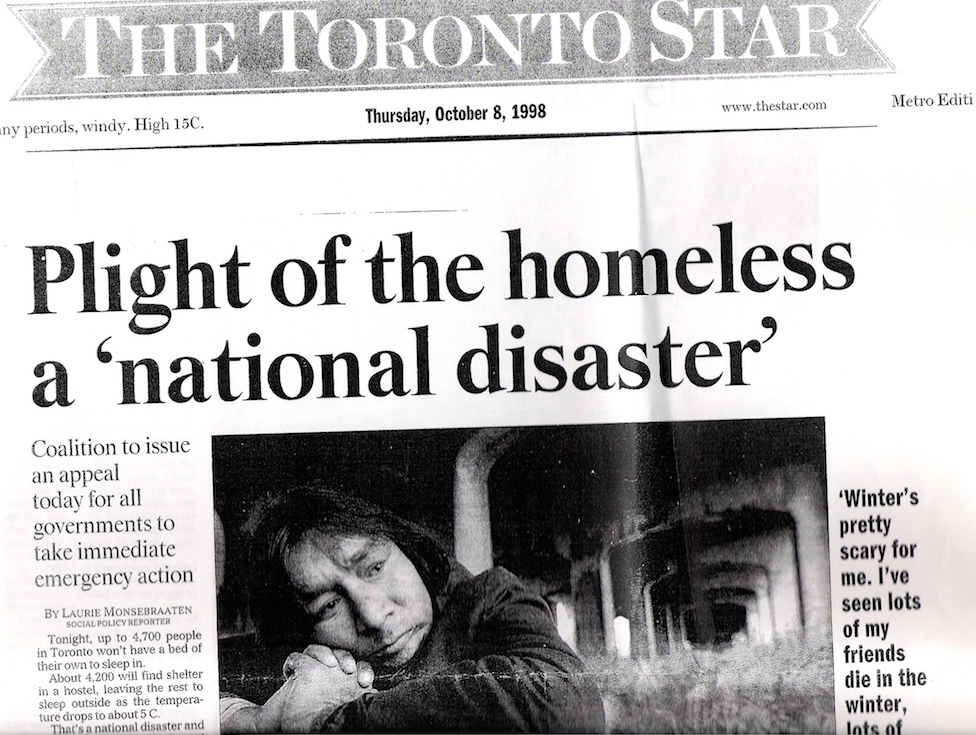In 1998, homelessness worsened so badly in Toronto and across the country that a group formed the Toronto Disaster Relief Committee. We issued The State of Emergency Declaration and called homelessness a national disaster. That campaign and momentum led to a new federal homelessness program. However, a series of federal governments held out and shamefully ignored the call for a national housing program.
Twenty years later homelessness has worsened across the country to an almost post-apocalyptic state because we have not seen commitment by the federal government to fund and ensure a new supply of social housing that is truly affordable. There is only a “national housing strategy,” which has not made a dent in the human disaster.
So now, 20 years later, we launch a new network with a mantra of Shelter Rights, Housing Rights, Human Rights.
The Shelter and Housing Justice Network is a collective of homelessness and housing advocates, shelter providers, health-care professionals, faith leaders, legal workers and researchers who have come together to again declare homelessness a disaster, and to address the crisis on a local, provincial and national level.
“For many years — for many, many years — we have continued to raise concerns about the suffering that homelessness inflicts upon our city’s most vulnerable residents,” Steven Meagher of the Christie Refugee Welcome Centre told reporters at the media launch.
He added:
“And for far too long we have heard our political leaders acknowledge that we must do better when it comes to addressing homelessness. And yet, despite this recognition, the crisis has only continued to worsen, with the impacts becoming more widespread and severe. Today we say enough.”
In an Open Letter to Mayor Tory and City Council the group writes:
“In a city as wealthy and prosperous as Toronto, it is both shocking and heartbreaking to witness how terrible the situation has become for homeless individuals in our city. On a nightly basis, women and men are warehoused in crowded, unsafe environments with no privacy or dignity; due to a lack of available shelter space, homeless children and their families are forced to sleep in precarious circumstances throughout the city; and with each passing year, more and more people are becoming trapped in the emergency shelter system for extended periods of time with no access to affordable housing or the supports they require to move forward.
The data on homelessness in Toronto is similarly bleak. Currently, there are over 6,600 individuals and family members in the emergency shelter system each night, and another 800 to 900 individuals in emergency overflow and respite sites, which now operate year-round in response to the crisis. Meanwhile, the waiting list for social housing in Toronto has grown to over 98,000 households, leaving both the homeless and those living in poverty with practically no opportunity for affordable accommodations. And perhaps most startling, last year 100 individuals died homeless in Toronto, and each month more names are added to the Toronto Homeless Memorial in our city. As we’ve said, this is a disaster, and after decades of inadequate responses we have now reached a point where we can no longer continue with the status quo when it comes to addressing homelessness in our city.”
The group goes on to list demands that are likely similarly needed across the country.
1. That the City of Toronto call a state of emergency as it relates the homelessness crisis in the city.
2. That, due to its impact on people who are homeless, and the rising number of overdoses and overdose deaths in and out of the shelter system, that the City of Toronto call a state of emergency as it relates to the opioid crisis, and seek provincial and federal assistance in the fast-tracking and funding of overdose prevention sites and other overdose prevention initiatives.
3. That the City of Toronto immediately open all four Sprung Instant Structures, and any other available spaces to ensure there is adequate access to shelter during this current emergency, including safe spaces for women, children, LBGT individuals, as well as harm reduction and low-barrier options.
4. That the City of Toronto open an additional 1,000 shelter beds in 2019 (this, in addition to the beds already scheduled to open), in order to respond to the dangerously overcrowded occupancy levels currently being experienced in all sectors of the city’s shelter system.
5. That the City of Toronto commit to investing in the creation of 100,000 rent-geared-to-income housing units over the next 5 years (20,000 units per year).
6. That all levels of government, including the City of Toronto, immediately commit to investing an additional one per cent of their total existing budget to solving the housing and homelessness crisis at the municipal, provincial and national level.
The letter concludes with:
“In order to make the fundamental changes required to effectively address homelessness, it will require courage, compassion and political will from you and your colleagues at Toronto City Council. Today, we are calling on you to be those leaders — we are imploring you to take a stand, to act with courage, and to lead with compassion. Unless and until you do, this humanitarian disaster will continue to plague our city’s most vulnerable residents, and ultimately Toronto as a whole will be made to suffer the consequences of your inaction and indifference. We must do better, and we need to start now.”
Make your city council and elected leaders responsible too! Fight to win!
Cathy Crowe is a street nurse, author and filmmaker who works nationally and locally on health and social justice issues. She has fostered numerous coalitions and advocacy initiatives that have achieved significant public policy victories. Her website is www.cathycrowe.ca. Follow her on Twitter @cathyacrowe.
Help make rabble sustainable. Please consider supporting our work with a monthly donation. Support rabble.ca today for as little as $1 per month!




